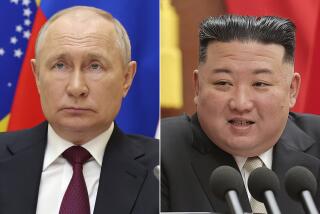A Paper Trail That Leads to White House : Documents show earlier date of U.S.-Iraq nuclear coziness
- Share via
A few hours after a testy President Bush emphatically denied that the government knew American technology sold to Iraq in the 1980s was being diverted to nuclear weapons development, the chairman of a House subcommittee investigating exports to Saddam Hussein’s regime made available documents that “tell us the President’s denials are not true.”
Rep. Sam Gejdenson (D-Conn.) cited newly declassified documents showing that as early as 1985, the Defense Department objected to transfers of nuclear technology to Iraq out of fear that it would be used for military rather than peaceful purposes. The Pentagon’s concerns reflected repeated warnings from U.S. intelligence agencies about the scope of Baghdad’s nuclear weapons program and the political commitment behind it.
Those warnings were fully justified. An analysis by Gedjenson’s House foreign affairs subcommittee staff of 771 export licenses to Iraq issued under the Reagan and Bush administrations found that a startling 162--21%--had potential nuclear applications.
A further tip-off should have come from the buyers of this technology: More than 100 were Iraqi government facilities. What Baghdad did with this technology became startlingly obvious last year, when U.N. inspectors were able to examine firsthand Iraq’s nuclear facilities--or at least those they knew about. Iraq was found not only to have made huge investments in its nuclear arms program, but it had achieved alarmingly more progress than the world suspected.
A President cannot, of course, know what every government file contains or what the purpose is of each export license the Commerce Department grants. But certainly Bush knew of the decisions that shaped U.S. policy toward Iraq in the 1980s, just as he knew that the exports to Iraq permitted during this time aimed at serving that policy.
As vice president under Ronald Reagan he took part in many of the discussions that shaped what became an unmistakable tilt toward Iraq in its war with Iran. As President in his own right, he issued a directive mandating warmer relations with Iraq, the object being to try to moderate Saddam Hussein’s tyrannical and menacing behavior. Bush has since conceded that the policy failed, that despite all the favoritism shown Iraq no fundamental easing of its policies or lessening of its belligerency occurred.
Meanwhile, thanks to the generous agricultural credits that in some cases were diverted to weapons programs and thanks to approval--over Pentagon objections--of technology sales that helped Baghdad’s weapons programs, the Iraqi dictator was getting away with what he might have called the mother of all con jobs.
Several congressional committees, sifting through mountains of documents and testimony from past and present government officials, are slowly filling in a picture of how U.S. policy toward Iraq was secretly shaped in the 1980s. There is a sense that much remains to be revealed. The President sees this issue that won’t go away as “pure, gut American politics.” That it is now in the political arena was inevitable. That it was thrust there by a highly dubious policy with which Bush himself was closely involved is undeniable.
More to Read
Get the L.A. Times Politics newsletter
Deeply reported insights into legislation, politics and policy from Sacramento, Washington and beyond. In your inbox twice per week.
You may occasionally receive promotional content from the Los Angeles Times.










